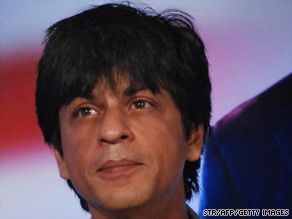Editor's note: Chandra Bhatnagar is a staff attorney with the American Civil Liberties Union's Human Rights Program and principal author of "The Persistence of Racial and Ethnic Profiling in the United States," recently submitted to the U.N. Committee on the Elimination of Racial Discrimination.

Bollywood actor Shahrukh Khan was detained by authorities at the Newark, New Jersey, airport.
(CNN) -- Earlier this month, one of the biggest movie stars in the world was flying from Newark, New Jersey, to Chicago, Illinois, when he was allegedly pulled out of a security line and questioned and detained for over 1½ hours, apparently because of his Muslim name.
Bollywood megastar Shahrukh Khan is adored around the world, with an estimated fan base of 3.5 billion people. His fame merited a wax figure at Madam Tussauds in London, England.
Khan had come to the United States to participate in Indian Independence Day events in Chicago.
What is significant about Khan's experience is not simply that it happened. Indeed, prominent Indian travelers including former Indian president Abdul Kalam and Indian Nobel laureate Amartya Sen have also been victims of racial profiling at airports, and countless other Indian and other South Asian travelers (be they Muslim, Hindu, Sikh, or Christian) have been subjected to similar forms of profiling and scrutiny.
What makes Khan's case particularly stinging, however, is that he had just completed filming "My Name is Khan," a movie that deals with discrimination against Muslims in the United States in the post-9/11 environment. Yet, there he was, a famous movie star, experiencing a poignant example of life imitating art imitating life.
Internationally, and particularly in India, the Shahrukh Khan incident has generated a lot of attention and anger. Khan is a symbol of Indian national pride. The indignity he suffered is emblematic of the insults faced by countless other Indian and South Asian travelers, and has led to demonstrations and burnings of U.S. flags in protest.
However, the Khan case provides a chance for American society to re-examine the breadth and depth of racial profiling, its impact on minority communities in the United States, and its harm to America's reputation around the world.
Source: CNN
Comments
Post a Comment